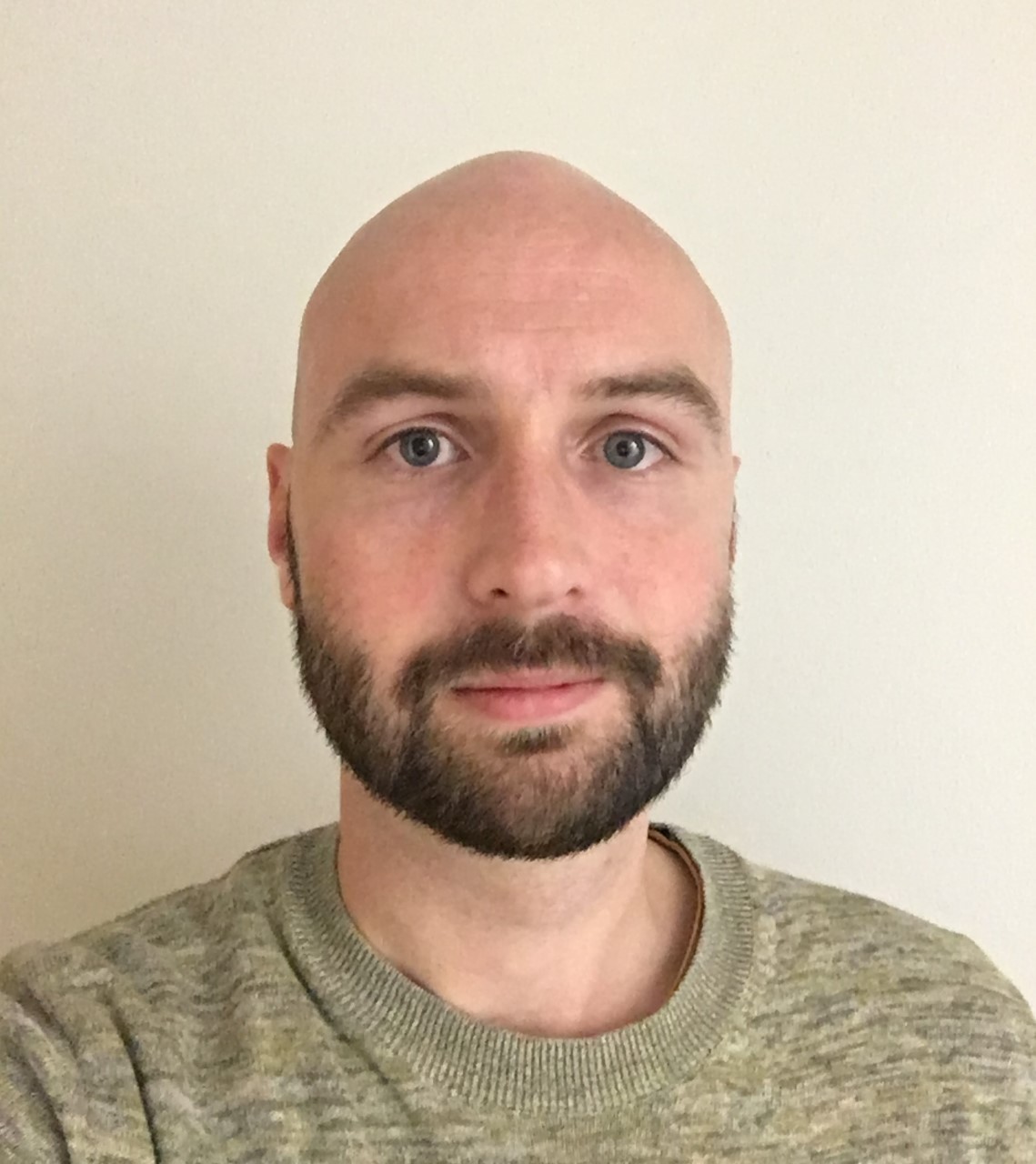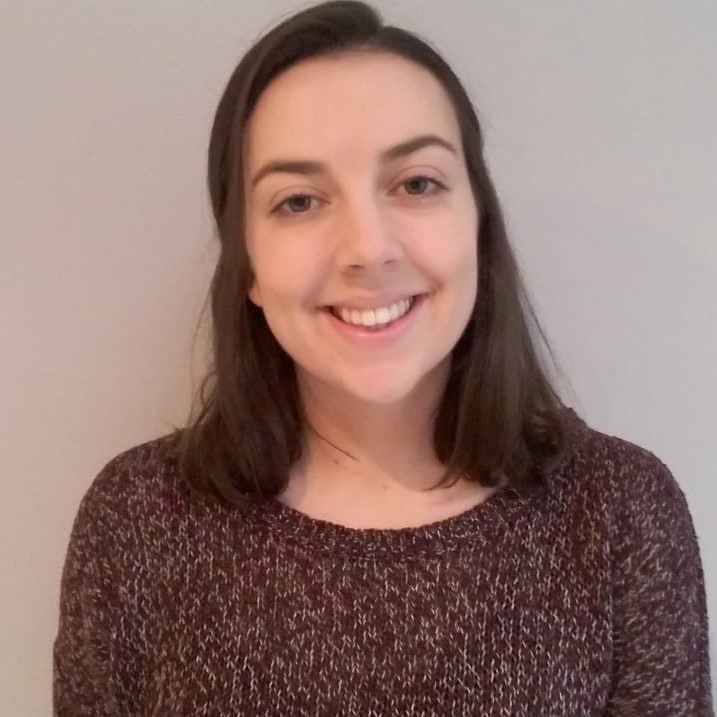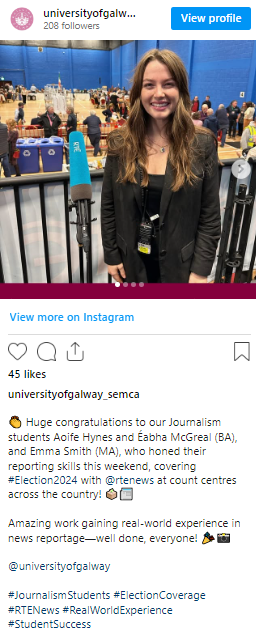-
Courses

Courses
Choosing a course is one of the most important decisions you'll ever make! View our courses and see what our students and lecturers have to say about the courses you are interested in at the links below.
-
University Life

University Life
Each year more than 4,000 choose University of Galway as their University of choice. Find out what life at University of Galway is all about here.
-
About University of Galway

About University of Galway
Since 1845, University of Galway has been sharing the highest quality teaching and research with Ireland and the world. Find out what makes our University so special – from our distinguished history to the latest news and campus developments.
-
Colleges & Schools

Colleges & Schools
University of Galway has earned international recognition as a research-led university with a commitment to top quality teaching across a range of key areas of expertise.
-
Research & Innovation

Research & Innovation
University of Galway’s vibrant research community take on some of the most pressing challenges of our times.
-
Business & Industry

Guiding Breakthrough Research at University of Galway
We explore and facilitate commercial opportunities for the research community at University of Galway, as well as facilitating industry partnership.
-
Alumni & Friends

Alumni & Friends
There are 128,000 University of Galway alumni worldwide. Stay connected to your alumni community! Join our social networks and update your details online.
-
Community Engagement

Community Engagement
At University of Galway, we believe that the best learning takes place when you apply what you learn in a real world context. That's why many of our courses include work placements or community projects.
Literature and Publishing (MA)
Course Overview
** Please note that the applications for this course will be closed on 18th March 2025 **
Founded in 1995, this long-established and perennially popular MA remains Ireland’s only postgraduate programme dedicated to literature and publishing. It is a distinctive offering that explores the interfaces between writing and the marketplace, between literature and transmission, and between the aesthetic and material aspects of texts. Over the course of this year-long programme, students deepen their existing knowledge of literature while also developing new competencies in areas such as marketing, the practical elements of editorial and production work, and the business aspects of contemporary publishing.
This MA not only strengthens academic skills in literary analysis and research, it also places a strong emphasis on preparation for the professional world. Students participate in workshops dedicated to topics like finding internships, writing cvs and cover letters, developing interview skills, and maintaining a personal digital brand; they may also be offered Adobe InDesign training. In addition, it is possible to gain valuable, hands-on publishing experience by becoming involved with ROPES, a literary journal developed, edited, marketed, and produced by this programme’s students on an annual basis. This extracurricular project provides students with practical, cv-enhancing experience in areas including editing and copyediting, decision-making, project management, design, production, marketing, sales, promotion, and teamwork.
Students in this programme benefit from contact with numerous guest speakers from publishing and related industries who share their experiences and perspectives. Visiting speakers in recent years have included individuals from Tramp Press, O’Brien Press, The Educational Company of Ireland, Coracle Press, Skein Press, Gill Books, and Cúirt International Festival of Literature, along with many other companies and organisations. The programme also facilitates visits to libraries, cultural institutions, publishing houses, printers, or other relevant businesses. Some students volunteer with book fairs and literary festivals, and some become interns with Irish publishers.
The MA in Literature and Publishing not only seeks to prepare students for the varied demands of the professional world, but it also cultivates core academic skills in oral and written communication, textual analysis, critical thinking, and research. Students are encouraged to take an active approach to shaping their course so that it complements their prior academic credentials and work experience and reflects their individual interests.
Applications and Selections
Applications are made online here. Applications will not be considered until they are deemed complete. Applicants to this programme will be asked to supply the following supporting materials:
- A personal statement of approximately 600 words.
- A 1–2 page cv listing academic and professional qualifications and achievements.
- Scanned copies of full university transcripts (informal print-outs of exam results will not suffice). Note: this is not required for applicants who earned their BA from University of Galway.
- A scanned copy of a passport or birth certificate. Note: this is not required for applicants who were previously enrolled as students at NUIG.
- Two academic references. This may take the form of: a) scanned letters of support from two academic referees; b) documents listing the names and full contact details for two academic referees who would be willing to provide a letter of recommendation if contacted by the programme director. Note: applicants who are a long time out of the education system and would struggle to find academic referees are advised to contact the programme director to discuss their situation.
Although admission to this programme is highly selective, there is not a single deadline for receipt of applications. Rather, applications are assessed and offers issued on a continuous basis each year until the programme has reached capacity. Early applications are welcomed and may enjoy a competitive advantage. In order to maximise eligibility for internal and external scholarship opportunities, non-EU applicants, in particular, are encouraged to apply as early as possible.
Each year, a number of students in this MA programme are successful in securing scholarships from a variety of sources and schemes. All Irish and EU applicants with a 1.1 BA result (or international equivalent) are eligible for a partial tuition scholarship, and there are a number of internal and external scholarship competitions open to non-EU students. More information can be found here.
Minimum entry requirements for this programme include an NQAI Level 8 qualification with an overall degree result of H2.2 and with a H2.1 in one subject (or a BA with a 3.0 GPA or equivalent). In addition, a minimum IELTS score of 7.0 or equivalent at least is expected of applicants whose first language is not English. Please note that admission to this programme is highly selective and meeting minimum achievement thresholds does not guarantee entry.
Who Teaches this Course
Ann Torres
Claire Commins
Michal Forwarczny
Requirements and Assessment
Assessment varies based on module selection but may include a mixture of essays, oral presentations, project work, and examinations.
Key Facts
Entry Requirements
Official qualifications and exam results (transcripts) to date: required for all non University of Galway applicants and for University of Galway graduates who did not receive their undergraduate degree from University of Galway. Applications who have still to graduate must upload final transcripts on receipt.
NQAI Level 8 degree with an overall degree result of H2.2 and with a H2.1 in one subject is required (GPA 3.0 or equivalent overall).
English language competency: IELTS score of 7.0 overall with no less than 6.5 in any one component.
Personal statement: All applicants must enclose a typed personal statement of approximately 600 words explaining why you wish to undertake the programme, outlining how it fits with your career and/or further education objectives.
Letters of recommendation: Two letters of recommendation, from Lecturers/Professors who have knowledge of the candidates academic history and achievements.
Passport or Birth Certificate: A copy of your passport or birth certificate must also be submitted.
Additional Requirements
Recognition of Prior Learning (RPL)
Duration
1 year, full-time
Next start date
September 2025
A Level Grades ()
Average intake
20
QQI/FET FETAC Entry Routes
Closing Date
No set closing date. See review dates website for information.
NFQ level
Mode of study
ECTS weighting
90
Award
CAO
Course code
1MLP1
Course Outline
Students complete 30 ECTS of taught modules in semester 1 and 30 ECTS of taught modules in semester 2. In semester 1, all students register for ‘Contemporary Publishing’ (10 ECTS) and ‘Publishing: Perspectives and Professionalisation’ (10 ECTS). The remaining credits are selected from a suite of offerings that may include such choices as ‘Introduction to Business’ (10 ECTS), ‘Introduction to Digital Humanities’ (10 ECTS), ‘Irish Drama and Theatre from Wilde to O’Casey’ (10 ECTS), ‘Representations of the Book in Literature and Film’ (5 ECTS), or ‘Media and Marketing Communications’ (5 ECTS). In semester 2, students register for 30 ECTS worth of modules such as ‘Copy-editing and Proofreading’ (10 ECTS), ‘Book History’ (10 ECTS), ‘Literature and Colonialism’ (10 ECTS), ‘Books Journalism’ (10 ECTS), ‘Medieval Aesthetics and Poetic Art’ (10 ECTS), ‘W.B. Yeats and the Cultural Revolution’ (10 ECTS), or ‘Literature of North America’ (10 ECTS).
In the final summer months of the programme, most students undertake the ‘Literature and Publishing Portfolio Project’ (30 ECTS). Portfolios contain several discrete pieces of work (approximately 15,000 words in total) related to contemporary literature and/or the publishing industry, and students have the flexibility to combine formal academic essays with other types of writing. In lieu of a portfolio project, some qualified students elect to complete the ‘Literature and Publishing Dissertation’ (30 ECTS). This option involves producing a single, extended piece of research-based academic writing (approximately 15,000 words) on a topic of the student’s own choice.
Curriculum Information
Curriculum information relates to the current academic year (in most cases).Course and module offerings and details may be subject to change.
Glossary of Terms
- Credits
- You must earn a defined number of credits (aka ECTS) to complete each year of your course. You do this by taking all of its required modules as well as the correct number of optional modules to obtain that year's total number of credits.
- Module
- An examinable portion of a subject or course, for which you attend lectures and/or tutorials and carry out assignments. E.g. Algebra and Calculus could be modules within the subject Mathematics. Each module has a unique module code eg. MA140.
- Subject
- Some courses allow you to choose subjects, where related modules are grouped together. Subjects have their own required number of credits, so you must take all that subject's required modules and may also need to obtain the remainder of the subject's total credits by choosing from its available optional modules.
- Optional
- A module you may choose to study.
- Required
- A module that you must study if you choose this course (or subject).
- Required Core Subject
- A subject you must study because it's integral to that course.
- Semester
- Most courses have 2 semesters (aka terms) per year, so a three-year course will have six semesters in total. For clarity, this page will refer to the first semester of year 2 as 'Semester 3'.
Year 1 (90 Credits)
OptionalEN527: Literature Of North America - 10 Credits - Semester 1OptionalEN6140: Publishing History - 5 Credits - Semester 1
OptionalEN6142: Creative Arts Ideas Lab - 5 Credits - Semester 1
OptionalMK5139: Social Media Marketing Theory - 5 Credits - Semester 1
OptionalEN570: Book History - 10 Credits - Semester 1
RequiredEN6128: Publishing: Perspectives and Professionalisation - 10 Credits - Semester 1
RequiredEN579: Contemporary Publishing - 10 Credits - Semester 1
RequiredEN6133: Literature and Publishing Portfolio Project - 30 Credits - Semester 1
OptionalEN6143: Media for Social Change - 10 Credits - Semester 2
OptionalEN581: Copy-editing and Proofreading - 10 Credits - Semester 2
OptionalEN6139: Diversity and Activism in YA Fiction - 10 Credits - Semester 2
OptionalEN6101: Books Journalism - 10 Credits - Semester 2
OptionalEN547: Literature And Colonialism - 10 Credits - Semester 2
OptionalEN6141: SERVICE LEARNING: LITERARY STUDIES IN THE COMMUNITY - 10 Credits - Semester 2
OptionalMK5116: Negotiations - 5 Credits - Semester 2
Why Choose This Course?
Career Opportunities
Employers across a variety of sectors value not only the specific, publishing-related knowledge and competencies that MA in Literature and Publishing students acquire, but also the transferrable communication, research, project management, teamwork, and critical thinking skills that are cultivated over the course of this programme.
Many of our programme’s graduates have gone on to work in the publishing industry or related fields, such as arts administration, advertising, or public relations. Our graduates have launched successful careers in a range of fields, including publishing, advertising, bookselling, arts administration, social media management, and public relations.
Our alumni have secured internships or entry-level positions with companies including Gill and Macmillan, New Island Books, Four Courts Press, Random House, Columba Press, Mercier Press, ROADS Publishing, Lilliput Press, CJ Fallon, Educational Publishing Company of Ireland, UCD Press, Taylor & Francis Group, Springer Nature, Folens, Angry Robot, Penguin, Elsevier, and Educate.ie.
The MA in Literature and Publishing also provides a solid academic foundation for those interested in continuing their studies at PhD-level in English or related fields.
Who’s Suited to This Course
This course would suit a high-achieving student with a strong undergraduate background in a humanities discipline who is looking to deepen their existing knowledge of English literature while simultaneously acquiring new competencies in areas such as marketing, the practical elements of editorial and production work, and the business aspects of contemporary publishing.
Learning Outcomes
Transferable Skills Employers Value
Work Placement
Study Abroad
Related Student Organisations
Course Fees
Fees: EU
Fees: Tuition
Fees: Student levy
Fees: Non EU
For 25/26 entrants, where the course duration is greater than 1 year, there is an inflationary increase approved of 3.4% per annum for continuing years fees.
Postgraduate students in receipt of a SUSI grant – please note an F4 grant is where SUSI will pay €4,000 towards your tuition (2025/26). You will be liable for the remainder of the total fee. A P1 grant is where SUSI will pay tuition up to a maximum of €6,270. SUSI will not cover the student levy of €140.
Note to non-EU students: learn about the 24-month Stayback Visa here.
Find out More
Dr Alexandra Peat
E: Alexandra.peat@universityofgalway.ie
Quick Links
What Our Graduates Say

Damien Lynam | Commissioning Editor, Educate.ie
This MA gave me a good understanding of the publishing process and industry through a mixture of practical and more theory-based modules. I could then put that knowledge into action through the publication of ROPES. After completing the course I found that employers responded positively to the qualification and that it is well respected within the industry. This is evident by the number of MALP graduates I have come across at various stages of my career.

Tríona Marshall | Marketing and Publicity Officer, O'Brien Press
I had been interested in a career in publishing for years, so the MA Literature and Publishing seemed like a logical choice for me after my undergraduate degree. I was delighted with the variety of classes on offer, all of which were very different from anything I had studied previously, and many of which were practical in nature. Visits from industry professionals, as well as class trips to publishing houses and printers, gave us a fantastic insight into the publishing world. The publication of our own literary journal, ROPES, was challenging yet fascinating, and the hands-on experience of the publication process has proven invaluable in my current role. The value of the degree became clear to me when I was offered an internship in publishing shortly afterwards, which has since led to a full-time position.

Áine Mulloy | Innovation Designer, The Dock
After completing the MA in Literature and Publishing, I secured an events internship at Ashville Media before joining the Educational Company of Ireland (Edco) as a Market Research and Editorial Executive. While there, I studied part-time gaining a Postgrad Diploma in Digital Marketing. It was also during my years at Edco that I co-founded GirlCrew, an international social network for women that was scaled to fifty cities worldwide. As a founder I had many incredible experiences, including presenting a TEDx talk on race and representation and being named by Forbes as a Top EU Founder to follow. In 2019, I took a step back from the startup world to join The Dock, Accenture’s Global R&D and Innovation Centre as an Innovation Designer where I help clients solve complex problems. The MA gave me a good research grounding and a toolkit that includes critical thinking, a comfort with ambiguity, and the ability to problem solve.

Susan Bennett | Research Assistant, University of Galway
This course provides the perfect combination of practical and theoretical skills with good exposure to industry professionals through guest lectures (O'Brien Press, Tramp, Skein amongst others) and field trips (Penguin Ireland, RIA, Marsh's Library etc). It also offers support on CV preparation, interview and design skills as well as strong and interesting academic modules. The variety of options available meant that I could tailor the course to my own ambition and interests, resulting in the qualification that best suited me. A highlight of the course is the publication, entirely by MALP student colleagues, of the literary journal ROPES. This developed project management, teamwork and critical thinking skills while giving me valuable hands-on experience of the industry itself. The Masters in Literature and Publishing is a must if you are thinking of joining the publishing industry and gives graduates an excellent grounding for career development.
What Employers Say

Ivan O'Brien | Managing Director, The O'Brien Press Ltd
The book publishing world is hard to get into, with lots of applicants for every position. Graduates of the NUI Galway Masters in Literature and Publishing, the only Irish course which teaches directly about the industry, have demonstrated a real interest in and commitment to the world of books: we have employed several, and it has always been a good call! As an occasional guest lecturer, it is clear that the class are engaged and diverse. Their questions always show that they are learning in an environment that encourages exploration, and the real-world experience they get as part of the course means they know a good bit about the realities of the industry before they seek to work in it.in Connect with Ivan



















